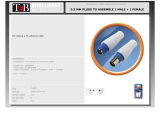
3
2.0 Table of Contents
Section Page
1.0 Warranty and Service ....................................................................................................................... 2
2.0 Table of Contents ............................................................................................................................. 3
3.0 Safety warnings ................................................................................................................................ 5
4.0 Introduction ....................................................................................................................................... 7
5.0 Specifications ................................................................................................................................... 7
6.0 Unpacking ........................................................................................................................................ 8
6.1 Contents of Shipping Container ..................................................................................................... 8
7.0 Assembly .......................................................................................................................................... 9
7.1 Air Supply Connection ................................................................................................................... 9
7.2 Dust Collection .............................................................................................................................. 9
7.3 Installing/Replacing Sanding Belt................................................................................................. 10
8.0 Electrical ......................................................................................................................................... 10
8.1 Grounding Instructions ................................................................................................................ 10
8.2 230 Volt Operation ...................................................................................................................... 11
8.3 460 Volt Conversion .................................................................................................................... 12
8.4 Extension cords ........................................................................................................................... 12
9.0 Adjustments .................................................................................................................................... 12
9.1 Sanding Belt Tracking and Oscillation
........................................................................................... 12
9.2 Oscillation Air Flow ...................................................................................................................... 13
9.3 Oscillation Speed ........................................................................................................................ 13
9.4 Platen Position ............................................................................................................................ 14
9.5 Replacing Graphite and Felt Pad ................................................................................................. 14
9.6 V-Belt Tension and Replacement ................................................................................................ 14
9.7 Conveyor Belt Tension ................................................................................................................ 15
9.8 Conveyor Belt Tracking ............................................................................................................... 15
9.9 Feed Rate ................................................................................................................................... 16
9.10 Pressure Bar Adjustment ........................................................................................................... 16
9.11 Table Parallelism ....................................................................................................................... 17
10.0 Operating Controls ........................................................................................................................ 18
10.1 Amperage Meter ....................................................................................................................... 18
10.2 LED Controller and Keypad ....................................................................................................... 18
11.0 Operation ...................................................................................................................................... 19
11.1 Braking System ......................................................................................................................... 19
12.0 Maintenance ................................................................................................................................. 20
13.0 Dust Port Layout ........................................................................................................................... 20
14.0 Troubleshooting the Sander .......................................................................................................... 21
15.0 Troubleshooting the LED Unit ....................................................................................................... 23
16.0 Replacement Parts ....................................................................................................................... 23
16.1.1 Base and Motor Assembly – Model WB-25 ONLY ................................................................... 24
16.1.2 Parts List: Base and Motor Assembly – Model WB-25 ............................................................. 25
16.2.1 Base and Motor Assembly – Model WB-37 ONLY ................................................................... 26
16.2.2 Parts List: Base and Motor Assembly – Model WB-37 ............................................................. 27
16.3.1 Base and Motor Assembly – Model WB-43 ONLY ................................................................... 28
16.3.2 Parts List: Base and Motor Assembly – Model WB-43 ............................................................. 29
16.4.1 Upper Cabinet Assembly – Model WB-25 ONLY ..................................................................... 30
16.4.2 Parts List: Upper Cabinet Assembly – Model WB-25 ............................................................... 31
16.5.1 Upper Cabinet Assembly – Models WB-37, WB-43 ................................................................. 32
16.5.2 Parts List: Upper Cabinet Assembly – Model WB-37 ............................................................... 33
16.5.3 Parts List: Upper Cabinet Assembly – Model WB-43 ............................................................... 33
16.6.1 Table Raising Assembly – Models WB-25, WB-37, WB-43...................................................... 34
16.6.2 Parts List: Table Raising Assembly – Model WB-25 ................................................................ 35
16.6.3 Parts List: Table Raising Assembly – Model WB-37 ................................................................ 36
16.6.4 Parts List: Table Raising Assembly – Model WB-43 ................................................................ 37
16.7.1 Table and Conveyor Belt Assembly – Models WB-25, WB-37, WB-43..................................... 39
16.7.2 Parts List: Table and Conveyor Belt Assembly – Model WB-25 ............................................... 40
16.7.3 Parts List: Table and Conveyor Belt Assembly – Model WB-37 ............................................... 41
16.7.4 Parts List: Table and Conveyor Belt Assembly – Model WB-43 ............................................... 42




















